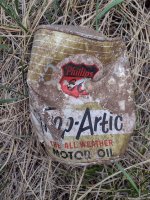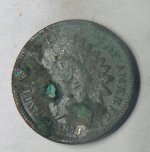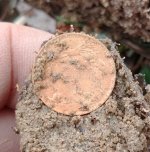Charmin
Bronze Member
- Sep 3, 2007
- 2,284
- 281
- Detector(s) used
- White's Prizm III and Ace 250
- Primary Interest:
- All Treasure Hunting
I have a photo-copy of a book written by my great-great-great grandmother Mollie E. Williams. Its called "A Thrilling Romance of the Civil War--The history of Mrs. Mollie E. Williams--written by herself". In this book she describes her life from birth in 1847, in the state of Mississippi, Monroe County. She was born to Hiram & Lavicia Brumely. She lost her mother in 1857. In 1859 her father remarried and she was sent to visit relatives in Arkansas. Her father went to Texas and fell victim to yellow fever and died. She became an orphan and wondered from roof to roof of relatives. Finally she came to reside with her aunt and uncle near Boston Mountain(Arkansas). Her uncle was a farmer there. In 1861 she mentions a "change was at hand"---two great sections of the nation--the North and the South--had grown bitter in their hatred of each other over the question of slavery and were straining their energies and resources preparing to engage in a fratricidal war. Mollie mentions how she was caught up in the spirit of the hour and one day repaired to the muster place to do all she could to encourage the men folks to espouse the cause that seemed sacred to them. The young and middle aged men were encouraged to enlist under the "stars and bars" of the Confederate flag. She mentions hearing the "swelling, all conquering notes" of "Dixie" being played and as the last lingering note of the song faded away, the volunteers took their places in line. They seemed to be possessed of but one idea--"To live and die in Dixie".
Mollie tells also of hearing the boom of the cannon and rattle of musketry in the once peaceful valleys of her home.
She mentions battles in the neighboring valleys and the horrid tragedy of war was enacted so near her home that she could hear the din and confusion of contending squadrons. After this engagement the army(Confederate) moved eastward. She had a sweetheart that was inlisted in the Confederate army and in order for him to write her a letter he had to puncture a vein on the back of his hand and inscribed the letter in his own blood---she says this was a habit of many Confederate soldiers because they had no ink to write with(this sweetheart is her second husband).
Mollie then describes a "new feature" that developed during the early years of the Civil War---guerilla warfare. Since most of the providers and protectors of the families were in the ranks of the army, these guerillas made many raids--robbing and killing. The marauding bandits in her locality were led by two degenerates known by the names of "Dog-Eyed Bill" and "Batterhead Sam".
Mollie was 15 at this time and entered into a marriage that she says was a "necessity" under the circumstances. So, in 1863 she married Henry Cole. Henry was in the Confederate army. He was wounded about three weeks after their wedding. A soldier came galloping up the lane to her house and told her that her husband had been dangerously wounded in an engagement and requested to see her. She asked the messenger soldier if she could ride back with him to where her husband was as she had no means of conveyance and no money. When she made it to the house that Henry had been carried to, she found him "weltering in his own blood" but he asked her to check her grief and said he would live and yet serve his country. He had a bullet extracted from a gunshot wound to his chest by Dr. Cole. Mollie then had to care for Henry and hide him from the guerrilla ruffians that were scouring the country in search of booty and to gratify their fiendish revenge. Henry would be murdered if he fell into their hands, so they put Henry on his horse and set out for the house of a friend situated in an obscure and unfrequented cove in the mountains, here they rested until a warning reached them that the mountain brigands were in the neighboring locality pillaging the desolate homes. She then took Henry further into the mountains and they made camp under the "overhanging cliffs" of a mountain glen. After a few weeks of recovery, Henry reported back to his command for service.
After her husbands return, she mentions another skirmish. The Confederate forces were led by Colonel Jackman and he defeated the "Federals" with 39 of their number(Union) left for dead. These were her enemies she said, but she felt sympathy for these dead men and helped bury them. She says some of the Federal killed were near a Union man's house and were not buried, but were left to be devoured by birds and in some instances were eated by hogs. The Confederate forces were at this time camped at the mouth of Dry Creek, where it emptied into the Richland. She went to visit her husband four days after this engagement at the Condederate camp and was "enjoying his company" at a house when the Confederate pickets were surprised and driven in by the Federals. This was on the 4th day of May, 1863.
The Confederates were then compelled to flee the mountains for safety and the Federals set about caring for their wounded and burying their dead. Soon after this the armies moved to the East and all communication was cut off "between the soldier boys and their families".
It was Spring and Mollie was living with her mother-in-law. She tells of trying to plant corn to "guard against actual starvation" because of the guerrillas had stripped their homes of everything they could eat and carry away. After the corn crop was laid by her mother-in-law suggested Mollie go visit Henry, whose command was then encamped near Batesville. When she arrived at the camp, she found it partially deserted and her husband absent. She learned that the Confederate army had recently been engaged in a hotly contested battle. On the following morning the soldiers commenced arriving back to the camp and brought with them their wounded and among whom was the captain of her husbands company, John H. Love. Mollie stayed for a week at the camp and helped mend and clean the soldiers clothing.
She then took her leave and headed home. She was but one day out on her return trip home, when Henry had orders to join the main division of Price's army on its famous raid through Missouri. Henry "resolved to see her once more" as he seemed to have a strange presentiment that he would never return from the raid. He applied for a short furlough and started on a dead run to overtake her if possible before she reached home. Mollie had stopped at a friends home to rest and Henry reached home before she did. He went back in search of her, fearing some calamity, but found her and they arrived home.
I'm going to stop here because Mollie doesn't mention any more battles. She just tells of her husband and how he died--its a really sad ending for Henry!
She then remarried(to Valentine H. Williams and lived on the banks of the Buffalo River. Later in life they moved to Oklahoma where she and Val had many children and a prosperous life). Molly also mentions how she accompanied her husband, Val, to a Masonic reunion and festival held in Marshal, the county seat of Searcy County(this might be another good place to detect if you could find the exact spot where the reunion took place and get permission to detect there, of course!).I thought maybe some of the Civil War battle sites would be of interest to those of you who metal detect in Arkansas.
I posted this in the "Civil War" section of TNet, too. I am going to re-read the book and see if I can find anymore places of interest in Arkansas that Grandma Mollie mentions and will post them if you all are interested?
Thanks for looking and reading!
sandcreek
Mollie tells also of hearing the boom of the cannon and rattle of musketry in the once peaceful valleys of her home.
She mentions battles in the neighboring valleys and the horrid tragedy of war was enacted so near her home that she could hear the din and confusion of contending squadrons. After this engagement the army(Confederate) moved eastward. She had a sweetheart that was inlisted in the Confederate army and in order for him to write her a letter he had to puncture a vein on the back of his hand and inscribed the letter in his own blood---she says this was a habit of many Confederate soldiers because they had no ink to write with(this sweetheart is her second husband).
Mollie then describes a "new feature" that developed during the early years of the Civil War---guerilla warfare. Since most of the providers and protectors of the families were in the ranks of the army, these guerillas made many raids--robbing and killing. The marauding bandits in her locality were led by two degenerates known by the names of "Dog-Eyed Bill" and "Batterhead Sam".
Mollie was 15 at this time and entered into a marriage that she says was a "necessity" under the circumstances. So, in 1863 she married Henry Cole. Henry was in the Confederate army. He was wounded about three weeks after their wedding. A soldier came galloping up the lane to her house and told her that her husband had been dangerously wounded in an engagement and requested to see her. She asked the messenger soldier if she could ride back with him to where her husband was as she had no means of conveyance and no money. When she made it to the house that Henry had been carried to, she found him "weltering in his own blood" but he asked her to check her grief and said he would live and yet serve his country. He had a bullet extracted from a gunshot wound to his chest by Dr. Cole. Mollie then had to care for Henry and hide him from the guerrilla ruffians that were scouring the country in search of booty and to gratify their fiendish revenge. Henry would be murdered if he fell into their hands, so they put Henry on his horse and set out for the house of a friend situated in an obscure and unfrequented cove in the mountains, here they rested until a warning reached them that the mountain brigands were in the neighboring locality pillaging the desolate homes. She then took Henry further into the mountains and they made camp under the "overhanging cliffs" of a mountain glen. After a few weeks of recovery, Henry reported back to his command for service.
After her husbands return, she mentions another skirmish. The Confederate forces were led by Colonel Jackman and he defeated the "Federals" with 39 of their number(Union) left for dead. These were her enemies she said, but she felt sympathy for these dead men and helped bury them. She says some of the Federal killed were near a Union man's house and were not buried, but were left to be devoured by birds and in some instances were eated by hogs. The Confederate forces were at this time camped at the mouth of Dry Creek, where it emptied into the Richland. She went to visit her husband four days after this engagement at the Condederate camp and was "enjoying his company" at a house when the Confederate pickets were surprised and driven in by the Federals. This was on the 4th day of May, 1863.
The Confederates were then compelled to flee the mountains for safety and the Federals set about caring for their wounded and burying their dead. Soon after this the armies moved to the East and all communication was cut off "between the soldier boys and their families".
It was Spring and Mollie was living with her mother-in-law. She tells of trying to plant corn to "guard against actual starvation" because of the guerrillas had stripped their homes of everything they could eat and carry away. After the corn crop was laid by her mother-in-law suggested Mollie go visit Henry, whose command was then encamped near Batesville. When she arrived at the camp, she found it partially deserted and her husband absent. She learned that the Confederate army had recently been engaged in a hotly contested battle. On the following morning the soldiers commenced arriving back to the camp and brought with them their wounded and among whom was the captain of her husbands company, John H. Love. Mollie stayed for a week at the camp and helped mend and clean the soldiers clothing.
She then took her leave and headed home. She was but one day out on her return trip home, when Henry had orders to join the main division of Price's army on its famous raid through Missouri. Henry "resolved to see her once more" as he seemed to have a strange presentiment that he would never return from the raid. He applied for a short furlough and started on a dead run to overtake her if possible before she reached home. Mollie had stopped at a friends home to rest and Henry reached home before she did. He went back in search of her, fearing some calamity, but found her and they arrived home.
I'm going to stop here because Mollie doesn't mention any more battles. She just tells of her husband and how he died--its a really sad ending for Henry!
She then remarried(to Valentine H. Williams and lived on the banks of the Buffalo River. Later in life they moved to Oklahoma where she and Val had many children and a prosperous life). Molly also mentions how she accompanied her husband, Val, to a Masonic reunion and festival held in Marshal, the county seat of Searcy County(this might be another good place to detect if you could find the exact spot where the reunion took place and get permission to detect there, of course!).I thought maybe some of the Civil War battle sites would be of interest to those of you who metal detect in Arkansas.
I posted this in the "Civil War" section of TNet, too. I am going to re-read the book and see if I can find anymore places of interest in Arkansas that Grandma Mollie mentions and will post them if you all are interested?
Thanks for looking and reading!
sandcreek






